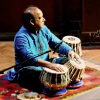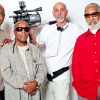Home » Jazz Articles » Album Review » Alice Coltrane: Live At The Berkeley Community Theater 1972
Alice Coltrane: Live At The Berkeley Community Theater 1972
This quality was the polar opposite of much of John Coltrane's music following A Love Supreme (Impulse, 1965)—though, as British tenor saxophonist Denys Baptiste demonstrated on his masterpiece The Late Trane (Edition, 2017), there was beauty, nuance and stillness in John's late-period albums if you had the ears to hear those things. But ferocity there undoubtedly was, too, and plenty of it. And Alice was a fully paid-up participant in that, again if you had the ears to hear it (admittedly, not always an easy thing to accomplish given the tumult going on around her acoustic piano and harp).
Live At The Berkeley Community Theater 1972 puts the final nail in the canard that Alice Coltrane was some sort of wafty harp-playing counterbalance to her husband's shamanistic saxophone. Coltrane is heard on harp and acoustic piano, but her focus for most of the 79 minutes of music—from a newly revealed, previously unreleased sound-board recording—is her Wurlitzer organ, here a barely tamed beast revelling in dissonance, decibels and passion.
The four tracks—each takes up one side of BCT's double-LP release—are high energy work-outs totally in the spirit of John Coltrane at his most unleashed. There are moments of calm, but not many of them. Bassist Charlie Haden and drummer Ben Riley provide a rock solid foundation for Coltrane's volcanic torrents of sound, which are approached but not exceeded in intensity by Aashish Khan on sarod, Pranesh Khan on tabla and Bobby W. on tamboura.
The sonic assault is at its height during the opener, "Journey In Satchidananda," a performance in blazing contrast to the 1971 album reading. But the firepower is pretty much maintained over the next three tracks, "A Love Supreme," "My Favorite Things" and "Leo." (It is not clear if the track sequence is as-performed, and Alice's spoken introduction to "Satchidananda" suggests it may have come at the conclusion of the concert). Alice did record one blissed-out version of "A Love Supreme," on World Galaxy. The Berkeley reading, given a year later, is something else again, closer in feel to the versions of "My Favorite Things" and "Leo" on John's posthumously released Live In Japan (Impulse, 1991), recorded in 1966 by a full-throttle quintet which included Alice.
Live At The Berkeley Community Theater 1972 is released in a limited edition of 750 copies, many of which have already been snapped up. Audio quality is excellent. Hopefully, the album will in due course become available on CD. The calibre of the music and its recording certainly justify a general release.
Track Listing
Side One: Journey In Satchidananda. Side Two: A Love Supreme. Side Three: My Favorite Things. Side Four: Leo.
Personnel
Alice Coltrane
pianoCharlie Haden
bass, acousticBen Riley
drumsPranesh Khan
tablasAashish Khan
sarodAlice Coltrane: harp, acoustic piano, Wurlitzer organ; Ashish Khan: sarod; Pranesh Khan: tabla, naal; Bobby W.: tamboura, percussion.
Album information
Title: Live At The Berkeley Community Theater 1972 | Year Released: 2019 | Record Label: BCT
Tags
PREVIOUS / NEXT
Support All About Jazz
 All About Jazz has been a pillar of jazz since 1995, championing it as an art form and, more importantly, supporting the musicians who make it. Our enduring commitment has made "AAJ" one of the most culturally important websites of its kind, read by hundreds of thousands of fans, musicians and industry figures every month.
All About Jazz has been a pillar of jazz since 1995, championing it as an art form and, more importantly, supporting the musicians who make it. Our enduring commitment has made "AAJ" one of the most culturally important websites of its kind, read by hundreds of thousands of fans, musicians and industry figures every month.

























